#unreliable narrators
Text

....(the "emotionally intelligent one")....(emotional repression).
#exceptioncassiopeia721#ao3#dc#dcu#fanfic#ao3 fanfic#ao3 fic#ao3 kudos#i need more fics like this#funny#tim drake#dick grayson#jason todd#robin tim drake#titans tower#tim drake angst#unreliable narrators#titans tower au#jason todd angst#dick grayson angst#tim and dick#tw sui ideation
28 notes
·
View notes
Text
Yall is what happened in aftg really what happened, like we know Neil is a pathological liar so ...
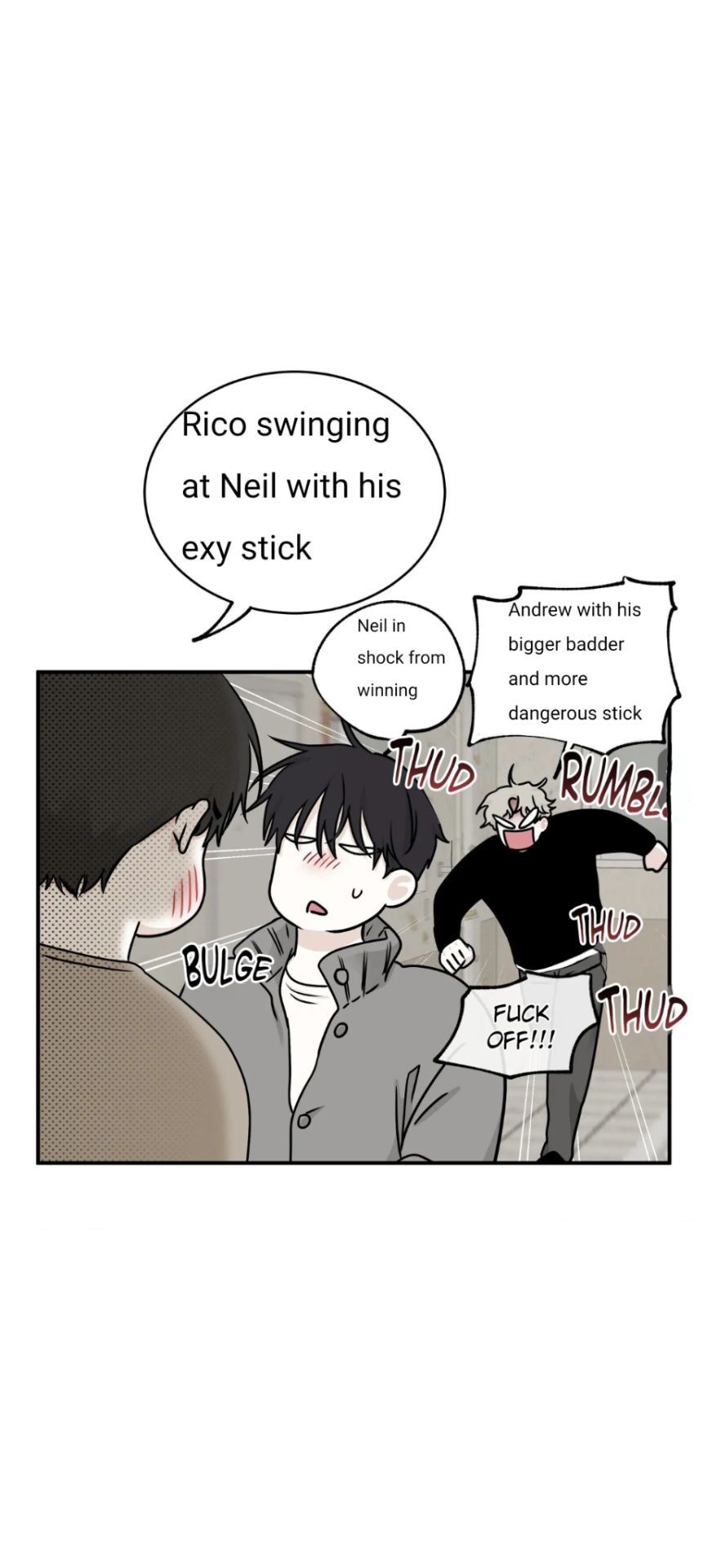
If I was a fox and was watching people mourn riko, I'd be soo annoyed
#all for the game#aftg#neil josten#psu foxes#unreliable narrators#riko moriyama#andrew minyard#so much plot idk what it is anymore
23 notes
·
View notes
Text
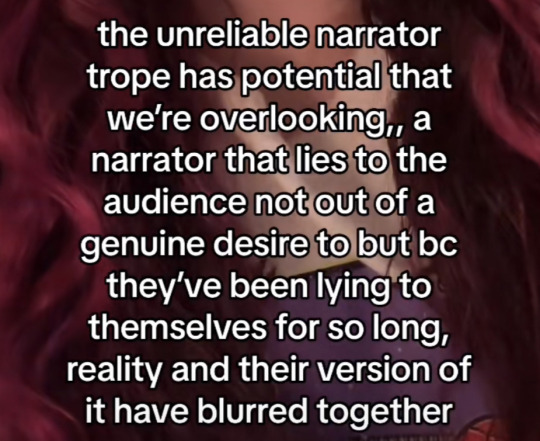
Kim dokja
1K notes
·
View notes
Note
Could you maybe write some prompts for portraying an unreliable narrator?
How to Write an Unreliable Narrator
-> 8 Tips to Writing Unreliable Narrators - Writer's Digest
make them a liar. Have them commit their faults outright, contradict themselves in the narrative, prove them to be a liar by their actions, have them hint that they know more than they're telling, reveal the truth a little later than they should, or have gaps in their memory.
shift their motives. Give your character conflicting desires and changing drives. Keep your reader guessing about their true mindset. (Are they in love with Character B? Or are they obsessed with Character B? Do they want to help B, or do they want to harm B?)
make them more clever than they appear. Have your reader believe your character is innocent and incapable of cunning and calculating schemes. Maybe they appear innocent and naive to the reader, and only later it is revealed that their childish actions have purpose.
use your secondary characters. Have them catch your narrator in lie, reveal that they are a victim of your narrator's lie, reveal a truth that the narrator has yet to share with the reader. How they treat the narrator can also show their unreliability. Sharing personal histories with the narrator may expose a side to the narrator that the reader hasn't seen.
add an unpredictable act. When a calm, thoughtful, innocent character suddenly does something out of character and a little unhinged, they become unreliable. (ex: a grieving woman suddenly throws all of her husband's belongings in the lake.)
4 Types of Unreliable Narrators:
-> What Is an Unreliable Narrator? - MasterClass
Picaro. The picaro is a character who has a knack for exaggerating.
Madman. The madman is unreliable because they are mentally detached from reality.
Naif. The naif’s narrative abilities are impacted by inexperience or age.
Liar. The liar is the most deliberate of all the unreliable narrators. The character fabricates stories, often to paint a better picture of themselves or achieve a desired outcome.
If you like what I do and want to support me, please consider donating! I also offer editing services and other writing advice on my Ko-fi!
#creative writing#writeblr#ask box prompts#how to write#how to write an unreliable narrator#unreliable narrators#writing help#writing advice#writing tips#writing tools#writing characters#writing resources#writing prompts
1K notes
·
View notes
Text
I'm on a duet kick and I'm marvelling about what an amazing song Somebody That I Used to Know is from a narrative perspective. We're told this sad tale about love and we're all sympathizing with this poor man:

And then the girl shows up shouts, "UNRELIABLE NARRATOR!"

The guy tries to get us back, "No wait! This is my pity party! Hear my sad tale again." But he's lost us, we can't see him in the same way again. The spell is broken. And the spell remains broken, you cannot hear the first verse in the same way ever again.
The acting in the music video too, the way he silently accepts her words. The way he flinches as she talks. He was trying to write his own narrative but he can't stand hearing the truth. And he has no new rebuttal, he can't refute her.
858 notes
·
View notes
Text
UNRELIABLE NARRATORS; FINALS.
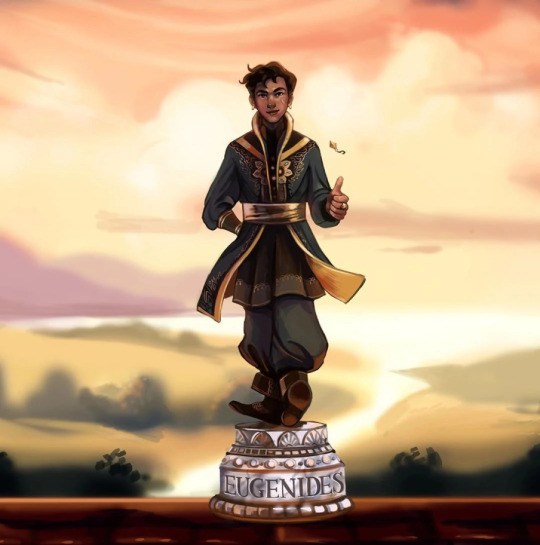
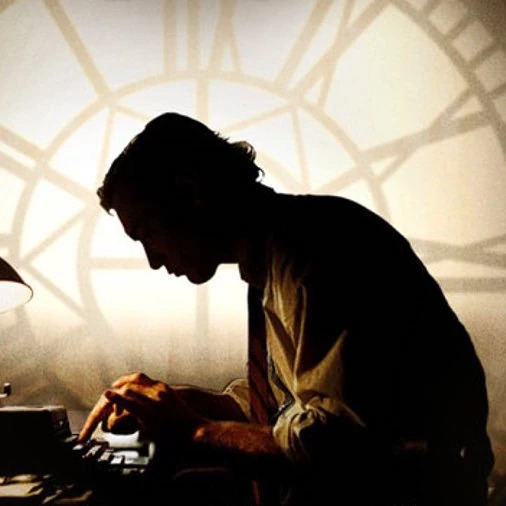
Eugenides Propaganda:
the entire plot hinges on a detail he lets the reader (and every other character) assume is true. I don't want to spoil it because it's a really fun reveal but he is lying from the first second he appears on the page and you can't trust him to tell the full truth about ANYTHING related to himself and his goals. he mostly does it to keep his advantage and not have other characters be suspicious of him but it's just so fun when you realise he's been lying the whole time
Lemony Snicket Propaganda:
(I would like to preface this by saying that Lemony Snicket is the author's pen name, not a real person, and he exists as a character in-universe as well as being the one in-universe who writes the books!) I'd say he's unreliable because he spent time collecting information about the Baudelaire kids and then... wrote books about it. He has no idea what any of their dialogue actually was, what they were thinking, or even the whole plot, he's just doing research into the incidents and then filling in the gaps to make it a story. What ACTUALLY happened to the Baudelaires? Nobody really knows for sure
While the Baudelaire siblings are in potentially life threatening danger, he will randomly start talking about his own life and just leave the siblings hanging. For example, once Count Olaf was threatening to kill Violet, and then Lemony randomly began talking about how he met the love of his life at a costume party. This man CANNOT stay on topic. Usually when a new character is introduced, Lemony tells us right at the start that they’re either going to die or that the Baudelaire siblings will never see them again. Foreshadowing is not subtle in these books. CONSTANTLY emphasizes how miserable he feels while writing these books. At one point he admits that he had to put his pencil down and go cry for a while because of how sad it made him. Once he filled an entire page with nothing but the word “ever” to emphasize how dangerous it is to put forks in electrical outlets. He also repeated a paragraph about deja vu later on in the book to give the reader deja vu.
#lemony snicket#a series of unfortunate events#asoue#asoue books#asoue netflix#eugenides#queens thief#queen's thief#the queens thief#the queen's thief#megan whalen turner#unreliable narrator battle#unreliable narrators#polls#finals#this is gonna be a coughing baby vs hydrogen bomb isn't it.
2K notes
·
View notes
Text
What is an Unreliable Narrator? And How to Write One.
An unreliable narrator is a storytelling technique where the narrator's credibility or truthfulness is questionable. The narrator either intentionally or unintentionally provides a distorted or biased account of the events, characters, or situations in the story. This narrative approach can add complexity, suspense, and intrigue to your writing. Here's how you can create an unreliable narrator:
1. Establish a motive: Determine why the narrator is unreliable. It could be due to personal bias, mental instability, deception, or a hidden agenda. Develop their backstory, motivations, and beliefs to understand why they might present a skewed version of events.
2. Use subjective language: Incorporate language and descriptions that reflect the narrator's personal viewpoint and biases. Their opinions, emotions, and interpretations should color their narration, influencing how readers perceive the story.
3. Include contradictions and inconsistencies: Allow the narrator to make contradictory statements or present conflicting information. This creates doubt and keeps the readers engaged as they try to unravel the truth.
4. Reveal information selectively: The unreliable narrator might withhold or reveal information strategically, manipulating the readers' understanding of the story. This can create suspense and surprise as readers discover hidden truths.
5. Showcase unreliable perceptions: Explore how the narrator's perceptions and interpretations of events differ from reality. They may misinterpret actions, misremember details, or even hallucinate. These discrepancies add depth to the character and raise doubts about their reliability.
6. Use other characters as contrasting sources: Introduce other characters who present alternative perspectives or contradict the narrator's version of events. This contrast allows readers to question the reliability of the narrator and form their own interpretations.
7. Employ narrative techniques: Experiment with techniques like foreshadowing, symbolism, or unreliable memory to emphasize the narrator's unreliability. These devices can help blur the line between truth and fiction, leaving readers intrigued and uncertain.
8. Provide hints and clues: Drop subtle hints or clues throughout the story that suggest the narrator's unreliability. This allows readers to piece together the truth gradually and encourages them to engage actively with the narrative.
#writing#writing tips#writer on tumblr#writerscommunity#character development#writer tumblr#writblr#writing advice#oc character#writing help#unreliable narrators#your narrator
2K notes
·
View notes
Text
Through the Looking Glass
From fairytale in Season 1 to stark reality in Season 2 of Our Flag Means Death- meta ported across from this Twitter thread by popular demand!
This thread contains spoilers for the entirety of OFMD Season 2
First OFMD S1 rewatch since S2, and holy shit, if you haven't done that yet... do that. A thing that it made instantly clear: they told us *all along* where this was going, but there was a reason we didn't see it. Because we were living in Stede's world then. Now it's Ed's.
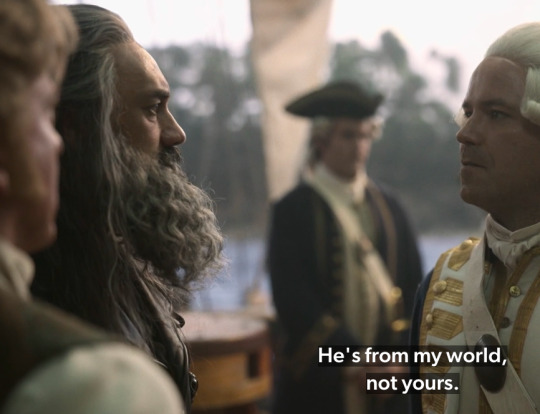
I know that a lot of us have felt that the tone shift at the end of S2 was... jarring, compared to what's come before. This felt like a show that wouldn't go there. One where being run through was a temporary hiccup. We've travelled all the way from this to this.
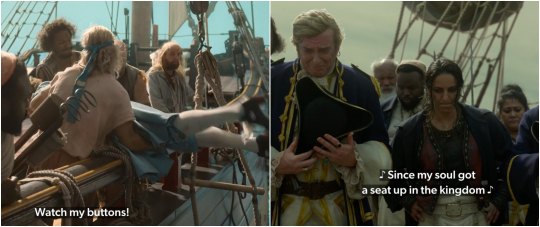
But we haven't jumped there without a journey in between. And from the minute we started hearing about Blackbeard, the show never tried to hide what Ed's world and his specific life was like. Not once. In fact they told us over and over and over.
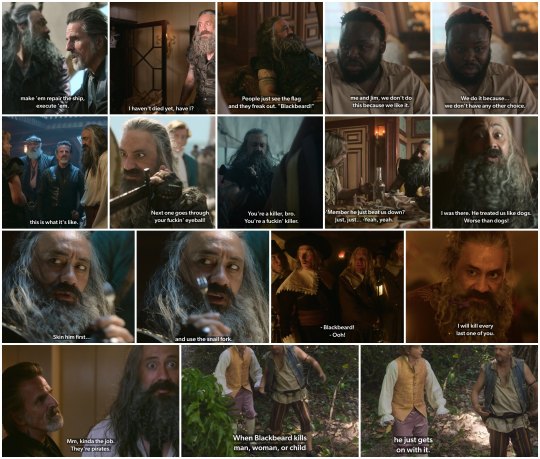
But Season 1 told us a lot of those things through song and story and fuckery. It blended reality with fiction.
Stede met the Blackbeard he knew through books and tall tales, and the real man was even more wonderful than he'd imagined.
We, along with Stede, were comfortable thinking that all those other tales were exaggerations and misrepresentations, and a lot of them very likely were.

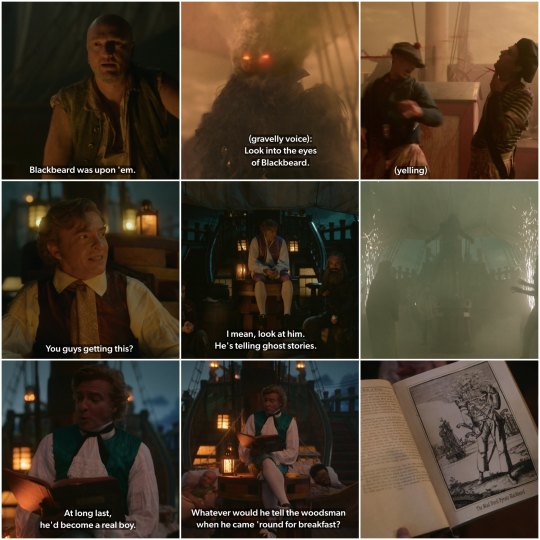
The Ed Stede got to know was a person who was capable of whimsy and silliness and loved soft things and doing something weird. Yep, he was also capable of violence and rage, but when he was with Stede, he didn't feel it so much.
This was a vacation from that life.
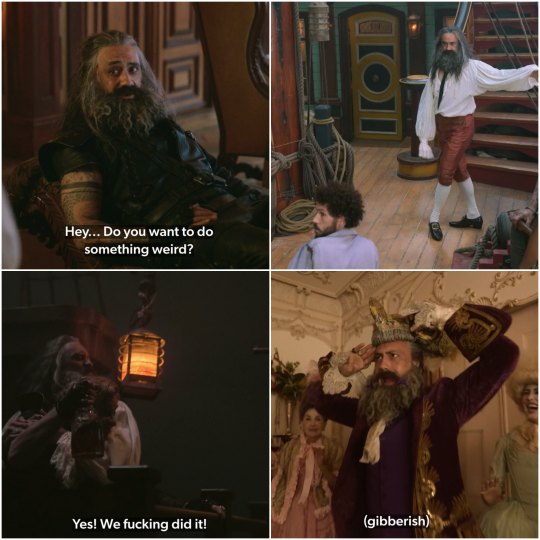
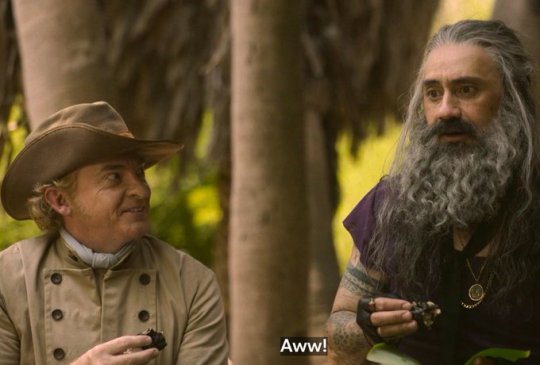
To Stede he was absolutely lovely... oh, and also a bloodthirsty killer. And Stede loved (and loves) everything about him, and both of those things can be true.
This is a perfect example of a spot where (in watching Season 1 without the benefit of hindsight) I assumed that everyone else in that pub was wrong, and Stede was simply trying to protect Ed's fearsome reputation by agreeing on the bloodthirsty bits. And I think from Stede's perspective that was largely true.
I think that's how they wanted us to see Ed, through his eyes.
Now, after watching both seasons, I think it wasn't the whole picture.
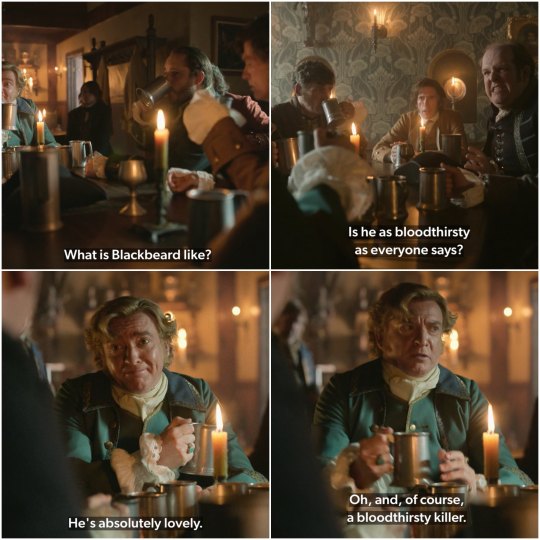
They told us, we heard it, we saw glimpses of it. But we (and Ed) were in Stede's run-away-to-sea fairytale the whole time.
It wasn't until Stede left that we saw the reality- the Ed we knew had been, to a degree, a fictional character all along.
I always saw this scene as Ed putting a bit of distance between himself and reality; it always felt like the Blackbeard of Stede's storybooks was the fictional one. But now it feels like the softer Ed that Stede knew was much the same- neither of them the whole story of who Ed was and is.
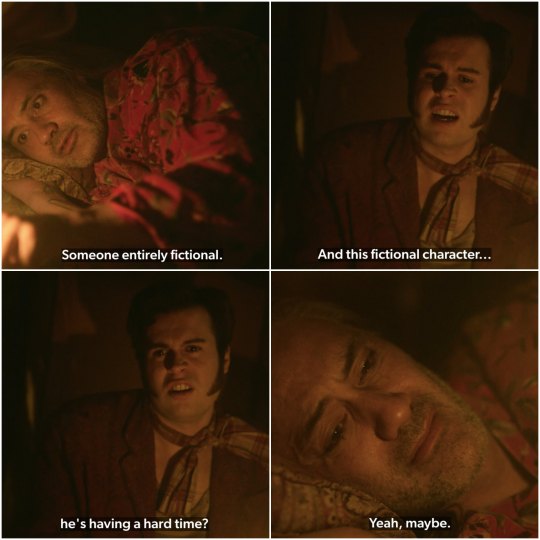
The one person who refused to live in Stede's fairytale was Izzy. I've seen people say it before, but he always gave off that vibe of the only human in the Muppets movie, or the guy who was in Black Sails while everyone else was in Pirates of the Caribbean. He saw the real risks clearly.
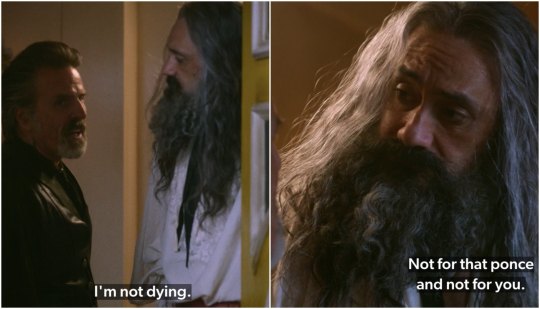
And in that light, the end of S1 has shifted an inch to the left for me, and I'm seeing it at a slightly different angle.
Izzy ripped away the healing Ed was doing, but in some respects he did it by tearing away the fairytale we'd all been living in, shoving Ed back into the Blackbeard story.
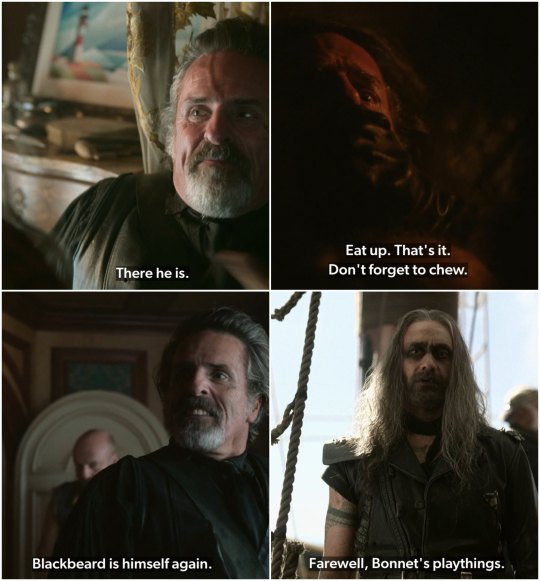
And that's where we pick up again in Season 2.
The fairytale reference came back in S2 in two notable places, those being Jim carrying that legacy forward in the darkest times, and in Izzy invoking the wooden boy against Ricky's efforts. Stede's made himself into a real boy. Ricky, nope.
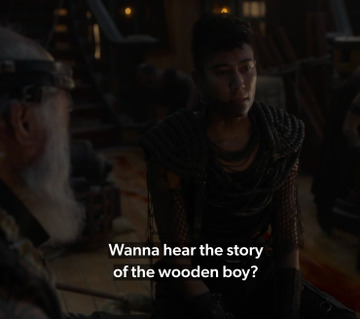

Now that I've watched both seasons together, the tone shift doesn't feel so jarring at all, actually.
It feels like sliding through the looking glass, out of Stede's world, and into Ed's- a world that existed all along; we were just seeing it, la vie en rose, through Stede's eyes.
At the beginning of S2, Stede's gone, and we're seeing it unfiltered through Ed's reality.
But Stede wasn't lying when he said he loved everything about Ed. He made a promise to come back and find him- he went down into Ed's darkest place and reminded him that no matter how bad things got, there WAS someone waiting for him, ready to love him.
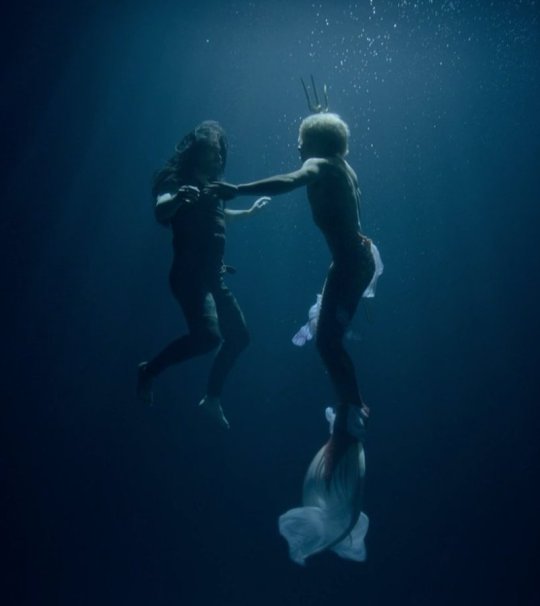
The contrast between S1's fantasy and S2's reality (excluding mermaids and actual bird guys and cursed coats) is stark, but it really is that.
We have the same settings, the same people, and very different ideas and outcomes at different times.
But it was always there.
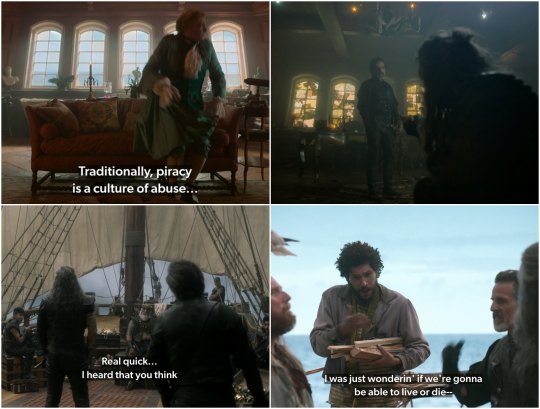
Things do come back to a state of (precarious) balance once they're all together. Apologies are made, whether they're spoken out loud or through actions. Things go right, things go wrong. Healing happens. Izzy continues to have the steadiest, most real through-line in the story as he tracks toward redemption, finds acceptance, and to an extent finds himself.
Once again, I hate that they went here with the ending and I wish they hadn't. But it got a fraction easier for me looking at it not as a continuation of Stede's fairytale, but of the grounded-in-pirate-reality arc Izzy was always on, even while we lived in Stede's world.
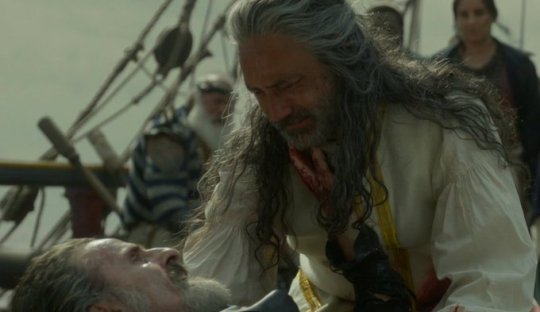
Where does that leave us? We're not going back to the fairytale, but we're not going to be living in Black Sails for S3, either. We've hit a fusion point where S1 ended with each of them going to separate, miserable homes, but S2 ended with them in the same place, ready and willing to make a go of it.
Season 3 is going to give us their world, together.

I LOVED the moments in this season where the deep emotions were in balance with the silliness I've always adored about this show. Eps4-6 were wonderful like that. Clearly we're not done with drama, either, but like Ed and Stede, I think we'll find a middle ground.
Anyway in conclusion, a rewatch of S1 after S2 somehow made me love the first season even more, which felt impossible? It's now gained /even more/ layers of depth than it had before. No matter how you feel about S2 I think it's worth that rewatch.
Adding one more bit of clarity for myself: I think we got a bit (intentionally) seduced in S1 by the idea that the Ed of the storybooks, the Vampire Viking Clown with the nine guns, was a version of him that others saw, when Stede saw the REAL person who 'worked' for Blackbeard.
In hindsight I think it's clear the Ed Stede go to know was also not the complete version of himself- the reality is, there's a whole spectrum between the two, and they've landed in the middle of it now. Ed intentionally leaned into the unlovable Kraken image to protect himself.
It very much didn't work, just like being just... Edward hadn't worked to protect himself, either. This season has been very much about pulling those two extremes together and finding all the parts that make up Ed overall (another thread on that here on Twitter, which I'll also shift across to Tumblr soon!)
And I think one of my favourite things in S2 has been seeing the way Stede SEES that- he knows what Ed's done, everyone's told him, but he still loves Ed. sees his trauma and how it affects him, and believes he's a good man regardless. He IS lovable; he's not forever broken.
And together, they can heal.
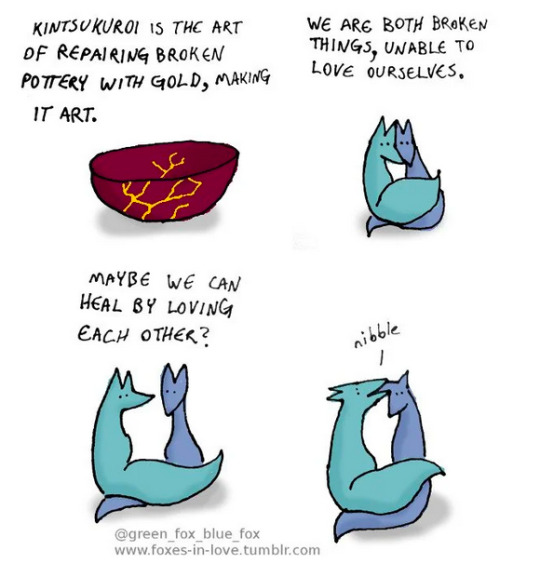
#ofmd#our flag means death#gay pirates#ofmd meta#unreliable narrators#fantasy vs reality#ofmd spoilers#ofmd s2 spoilers
618 notes
·
View notes
Text
Roderick Usher is such a good bait and switch of a villain! You spend most of the show watching his ‘downfall’ and corruption, knowing that he’s going to become the monster Dupin knows him as. But you still want to believe he can’t be all that bad, and he somehow knows this and plays right into it until the very end
Roderick is telling his story and peppers it with all these asides and moments that make the audience feel some sympathy for him. That make us believe he either has good intentions beneath everything else, or originally had them and was corrupted by power.
He implies he truly didn’t know Ligodone was addictive: he tells Dupin ‘you belive the chemist when he you tells you the drug they made isn’t addictive, you trust your company not to abuse the use of that drug’. He reminds Dupin (and by extension the audience) that he ‘didn’t make the damn thing, I just sold it’. And then it cuts to show that the drug company was originally acquired by Roderick’s predecessor as CEO, who took his pitch for a pain free world and ran with it. This makes the audience feel some small sympathy for Roderick: not enough to think he’s a victim in anyway but it worms in there and makes him not as monstrous as he was a moment ago. It implies he is not solely to blame.
The audience see’s (we think) Roderick getting corrupted and swayed to the dark side of corporate greed. Brilliantly they show Roderick in present day acting in ways that seem in character for what we have learnt about him, and then flash back to the 70’s to reveal that those lines or attitudes where originally those of the old CEO who Roderick *hated*. It appears as if pure innocent and trusting Roderick who runs straight at injustice has been corrupted by the old CEO, has become the monster or villain that he once hated. It’s a small tragedy mixed in with a busy narrative but it impacts the audiences view of who Roderick once was. We interpret this as an originally good if naive man corrupted by power and wealth. Coupled with all those scenes in the 70’s of Madeline being more emotionless and pragmatic, pushing Roderick to be more manipulative and strategic, it appears as if he has been ‘forced’ or ‘groomed’ into his role against his original intentions. Part of the scenes we then spent in the 70’s is spent quietly mourning this version of Roderick, as we know it doesn’t survive his ascension.
But there are enough moments to imply that Roderick is still being an unreliable narrator. When Dupin first apologised for faking an informant, saying he feels that his lie had some role in the death of his children, Roderick’s first response is to run with that false impression. The way he responds to Dupin’s apology sounds like he’s gearing up to lay into him about his role in Roderick a children’s death, to double down and agree that Dupin does bear some blame for how they died.
And then one of his dead children appear to him. They make him pause, collect himself, and acknowledge what Roderik knows to be true: Dupin’s lie had no bearing on their death (his deal with Verna is the reason they’re dead) and any impact of that lie on their final fate is solely due to Roderick believing it and then placing a bounty on the supposed informants head. He turned his kids against one another, Dupin’s lie was just the vehicle. Roderik only voices this when he is forced to by his literal ghosts.
There are several moments when it appears his dead children are ‘keeping him honest’. When he’s getting off topic Perry or Leo appear to shock him and remind him to keep telling their stories. When he tries to downplay his part in the creation of Ligodone and argue that the horrors of its addiction are actually due to a street derivative which ‘hasn’t been FDA approved’ Camille’s appears behind him to force him to reconsider and eventually interrupts him so abruptly he trows a glass at her. When he’s lamenting Frederiks death and remembering him as a child not an adult (the last time Roderick was any kind of father to him) Fredrick takes over child/Frederick’s body to remind him of how he died and to get back to the story. It’s almost like he’s saying ‘you don’t get to remember me like this, you don’t get to miss remember and pick and chose: this is how I died and it’s because of you so keep going’. It’s only in hindsight so we realise this was Roderick trying to subconsciously control the narrative and change this confession, to reframe his actions and those deaths. And the kids didn’t let him get away with it.
Even Juno as a narrative device helps to hide Roderik’s rotten centre: she is such a bluntly honest and sincere person, she lends a little credence of honesty to Roderick. We think he must have some small good in him (albeit wrapped up in all the ‘old enough to be Juno’s father, makes the opioid she’s addicted to, doesn’t defend her from family cruelty’ BS of his ‘love’) as she is devoted to and loves him. Plus when we first meet her he states he loves her, he is always shown to be gently affectionate towards her, and even claims she is one of his ‘two favourite ladies’ along with his granddaughter who we know he dotes upon. But then at the very end his twisted horror show of devotion is revealed: anything close to love he holds for Juno is warped by her being a living totem of his product, something he can point to and use to further his cause. Juno is an object to him, one he enjoys complete control over. He has never seen her as a person in her own right, just a doll/puppet to prop up his drug empire, and he can’t separate her or his feelings for her from the drug she is dependant upon.
Added to this, towards the end of the show we discover that this ‘unburdening’ of Roderiks sins, this confession to a litany of crimes, which will give Dupin closure for both his life’s work and answers to Roderick’s betrayal of him in the 70’s… that isn’t even Roderick’s idea! Verna told him to confess. Even at the end Roderick isn’t mending bridges of his own volition.
And then his final revelation: he’s been lying the whole time, maybe his whole life, to everyone. He had always know people would die to ensure his success, that he would have to climb over ‘a mountain of bodies’ to get to the top and it never once made him pause. He wasn’t corrupted, he didn’t get poisoned by the old CEO and his views, he didn’t change to take on more of Madeleine’s views. He just noticed the best way to get work done and adapted.
Dupin had it right from the start: the only good that he ever saw in Roderik was a reflection of Annabelle lee’s. Like the moon has no inherent light of its own, Roderik hid his darkness behind the strength of Annabelle’s goodness until the time came when she couldn’t shine on him anymore. And he was revealed for the empty dead husk he had always been.
And Annabelle even said it herself, when then kids chose Roderick over her. They were starving and he told them to gorge themselves but he could never actually feed them, because he had nothing real to offer. Empty through and through, and just. So. Small.
#the fall of the house of usher#mike flanagan#fuck Roderik usher#spoilers#tfothou#roderick usher#unreliable narrators#character analysis#media analysis
425 notes
·
View notes
Text
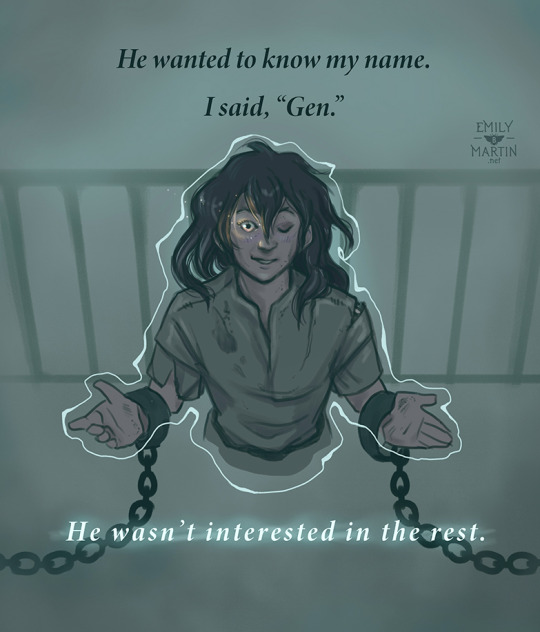
Ahahaha, I had NO DOUBT that Harrowhark would beat Eugenides in the most recent Unreliable Narrators poll from @makethosenarratorsfight, but he pulled through because he's a LYING LIAR WHO LIES and also TELLS THE TRUTH ALL THE TIME. I love Harrow to death and back but Gen doesn't need a lobotomy to tell you two different stories on two different rereads (and then a third different story after finishing the series).
(Also can I say how trippy it is to see my illustration set alongside the BOOK COVER of Harrow?? I spit my coffee every time it crosses my dash.)
#queens thief#eugenides#the thief#unreliable narrators#harrowhark#the locked tomb#harrow the ninth#make those narrators fight#megan whalen turner#tamsyn muir
468 notes
·
View notes
Note
Can you write some prompts for an unreliable narrator trying to apologize for what they did but they dont know/dont remember?
sure can!! i'm not quite sure what you're asking, so feel free to elaborate if these aren't what you're looking for ^^
unreliable narrator prompts: apologies
"They're telling me to apologize. For what?"
"I'm sorry. I really, truly am. But I don't know what I did."
"What else do you want me to say?"
"She told me she hated me. I said I was sorry. She asked me why. And--and I didn't know."
"I'm sorry, okay?! For however I hurt you, whatever I said that night, I'm apologizing!"
"They're looking at me. I don't know what I did. I whisper I'm sorry. They're still looking at me."
"Last night is all a blur, I swear, I don't remember--"
"You look mad. Sorry?"
"I-I can't apologize if I don't know what I'm apologizing for."
"He hasn't forgiven me. I'm--I'm so confused."
#writing prompt#dialogue prompt#writing prompts#prompt list#dialogue prompts#writers on tumblr#writing suggestion#writeblr#unreliable narrators#please credit if you use#^^
148 notes
·
View notes
Text
I saw a post saying that we don't see the abuse Riko suffered because Neil is unreliable. But that makes no sense. While we know to some extent that Riko must have had his own difficulties and potential abuse, Neil would have literally no reason to see it happening. The rest of the ravens would have no reason to see it considering he is meant to be King and be the best, he cannot afford to show weakness to them, so of course he wouldn't be showing that abuse to an outsider that he is trying to bring to heel and be his pet.
Similarly, I saw a post about us not seeing Aaron struggle with the trauma of killing Drake because of Neil's disdain and unreliability, but while Neil can guess that Aaron is struggling just as he guessed to Riko's abuse, one do you think Aaron would want to see him struggle. It's bad enough that he knows about the nightmares, Aaron wouldn't want to give him that ammunition either. And also, Neil doesn't care about many people. He cares about his team, but that's his team. And while Aaron is a part of that, he only really cares enough about Aaron because of Andrew. He wouldn't pay Aaron enough attention to see him struggling unless it was smack in his face. Like, make it make sense.
#all for the game#aftg#neil josten#aaron minyard#riko moriyama#andrew minyard#the foxhole court#unreliable narrators
108 notes
·
View notes
Text
Let's talk costuming: Angelic Robes and The Unreliable Narrator
It's two am, I have to be up at six, but this has been fermenting in the back of my head for the past five hours I've spent doing homework and if I don't get it out I shan't sleep.

The costumes we see representing angelic character in Season Two are VASTLY different from those we see in Season One. (See my post on Aziraphale's Job Robe for an in-depth art history analysis of this individual costume piece.) In season one, the angelic flashback clothing we see is rather humble and uncomplicated. As all things in this show, this serves a very important narrative purpose.

Let's first compare these gorgeous gorgeous girls to their S1 counterparts, shall we?

Just look at the collar on that robe! In S1, we're introduced to Aziraphale in a very plain tunic-style robe with an unfinished neckline. Aside from a slight gold decoration and draping on the shoulders, this could easily be mistaken for rather primitive human garb. S2, by comparison, introduces angelic costume as non-ostentatious but still refined with a gold-trimmed gathered neckline and wide sleeves. The fabric itself, on a textile level, is much finer and softer. Overall, the robes give an air of innocence and angelic purity that is lacking from Aziraphale's S1 'fit. Let's look at another example:
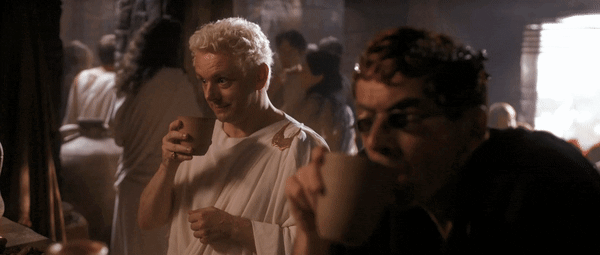
Their Rome costumes are strewn with so many incredible details (check out this incredible post from 2019) but they still retain a bit of that historical ruggedness. Same for these:

The argument could be made for pure historical compliance, sure, but to claim a lack of anachronisms in this show would be a flat-out lie. No, S1 Crowley and Aziraphale are very distinctively human in their dress. The cloth has a wider weave, the ornamentation is minimal, all around it serves to highlight their fitting-in with humans and the humanization of their characters. They're 'going native,' as it were, no doubt about it.
So why, in S2, is Aziraphale suddenly showing up looking like he just popped out of a renaissance painter's wet dream?

Simple. Suddenly, Aziraphale isn't an angel among humans acting human, he's an angel being an angel doing angel things. We get to see the rest of the heaven gang in full angelic decadence as well, a bold departure from the starkness of 'modern' heaven. If this is, as many of you lovely folk have speculated, a series of flashbacks from Aziraphale's memory, the design choices designate very clearly Aziraphale's perception of himself as an angel. A perception which, mind you, would likely be influenced by later human ideas of angelic and heavenly aesthetics. As an unreliable narrator, Aziraphale is showing us not his actual wardrobe as an angelic being but his perception of his past self.
Crowley, too, is affected by this shift in dress. Bildad the Shuhite is everything S1 flashback Crowley is not: fashion-forward, smooth-talking, and impeccably well-dressed. We've got three different fabric textures (that's three times as many as any of his biblical S1 robing) and a definable silhouette. He's practically a fashionista.

If this were all taken as an objective narrative, the shift back to billowing-void peasant Crowley at Golgotha, where we next see her chronologically, would be strange to say the least.
So why is the costuming of the S2 pre-modern flashbacks so much more elaborate? There's three possibilities I can imagine for a change in costume design for any show:
Budget: this is highly unlikely an instant rule-out for me. I've seen what costumers can do on a shoestring budget, and besides the later period costumes make this demonstrably false.
Change in production design team: Technically possible, yes, but if there's one thing Good Omens does well between seasons it's continuity. I mean, they burned the fucking bookshop and then hand-painted tiles to recreate it exactly for the second season. This is not Harry Potter. This isn't it.
An intentional design: Everything, and I mean everything, in this show is intentional. While not everything the wardrobe team does is easily decodable (see Crowley's shapeshifting sunglasses) we've got a pretty comfortable bit of time to figure such things out. This is the only option that makes a lick of sense.
Wonderful, so we've established that this is a narrative choice.
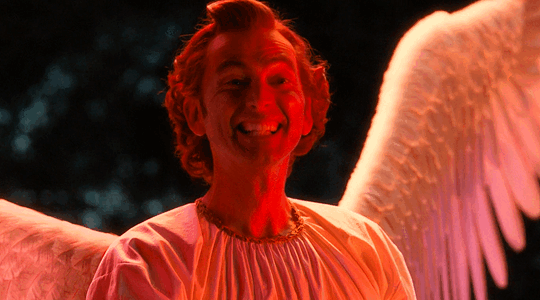
So if it's a narrative choice, and it's distinct from the stylistic choices of Season One, then someone is lying to us. Or rather, we have an unreliable narrator somewhere along the way.
Most of the buzz on ye olde tumblr focuses on the idea of Aziraphale as narrator and memory-holder for S2, and that would certainly make sense from both a story and design. Of course he would see Angel Crowley as adorable and innocent and angelic (the hair is not helping his case either omg I love her), and of course he would see himself as grandly, exaggeratedly, almost dissonantly angelic at the major turning point in his faith.
If Crowley is narrating, then it calls into question why he would choose to remember himself this way. It holds a sort of nostalgic sadness, a memory of a joyful innocence permanently lost to God's cruelty. When we see Aziraphale in angelic splendor later, we're reminded again of what Crowley has lost. It echoes the aesthetic of his former angel self, the gathering and gold trim and bright white fabric, but also introduces a much more elaborate silhouette that reflects the shift toward heaven's new high-and-mighty attitude.
Finally, I'd like to point out that by contrast Season One focuses heavily on themes of humanity rather than ethereality. Narrated by God, no less, who probably has thoughts on their assimilation. While I think we can assume God to be a more reliable narrator than Crowley or Aziraphale, it's not out of the question that She would have her own story to spin about our Ineffable Idiots' shared history.

Ultimately, I think it's safe to say that whatever's going on in costume design is a Clue to the story we're being told in S2 and the one we will be told in S3.
#I would commit unspeakable crimes to work wardrobe for this show#just let me sew on some buttons and I'll be happy as a clam#good omens#good omens 2#good omens season 2#good omens meta#good omens analysis#good omens costumes#costume design#ineffable husbands#unreliable narrators#angel crowley#go2#neil gaiman
202 notes
·
View notes
Text
The circular bookshop rug CHANGES?!
(Edit: this is the rug that rests on top of the portal, under the chandelier. I think(?) there's only one of those!)
I saw someone mention this in a comment, but haven't seen any pics or discussion about it yet, so I checked. It's another inexplicable (ineffable?) "continuity" error:
S2e1, prepping to do the half miracles to hide Jim!Gabriel:
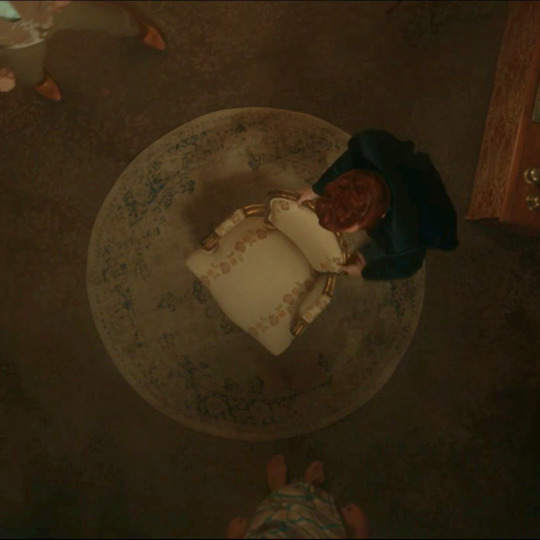
S2e5, as Nina enters the ball:

(More pics, including the season ONE rug, which was used for an s2 promo photo, and some discussion, below)
S2e5, prepping to defend the bookshop from the demons after Crowley walks most of the humans out:

S2e6, Crowley tidying the bookshop while Azi has a chinwag:
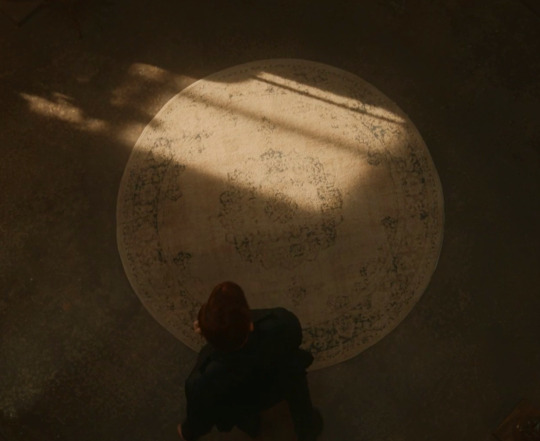
And sure, Aziraphale could have enchanted it to look more "Jane Austen-esque" for the ball, but then why did it change back in e6? It looks like Nina and Maggie's clothes for the ball stayed throughout e6, so it's not like the ball enchantments expired, Cinderella-style, or something...
Like the two different wigs for Crowley in Job, it seems superfluous to have two different rugs for the bookshop. And yet ...
It seems like it must be a Clue about something! Unreliable Narrator(s)? Another magic trick we didn't see? What do you think?
Edit 2: @rebeccasteventaylor had a good question about the rug in s1. I checked, and you'll perhaps be unsurprised to learn that the rug in s1e4, when Azi talks to Floating Head Metatron, is similar to s2e1 when they do the half miracle, but definitely not the same. The chairs also look similar but not exact:
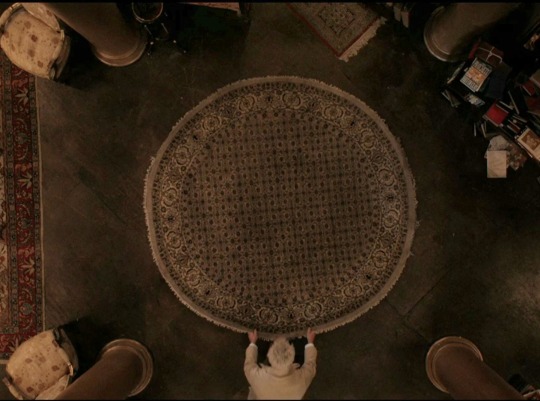
And here's a wider view of s1e4:
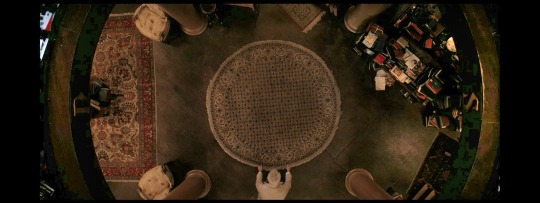
And a wider view of s2e1:
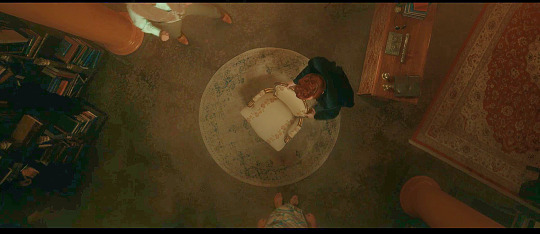
I understand they Actually Burned the bookshop and everything inside during s1, and then had to recreate it for s2 (there's a really wild post about recreating a hand painted antique tiled sink that talks more about that), so I don't know if the similar-but-not-exact chairs, big red rug, and round rug are more casualties of that, or are meant to look different...
Edit 3: EXCEPT. They USED the season 1 rug in season 2 promo photos!
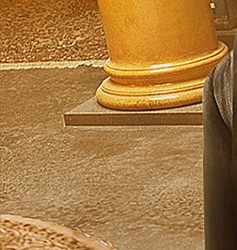
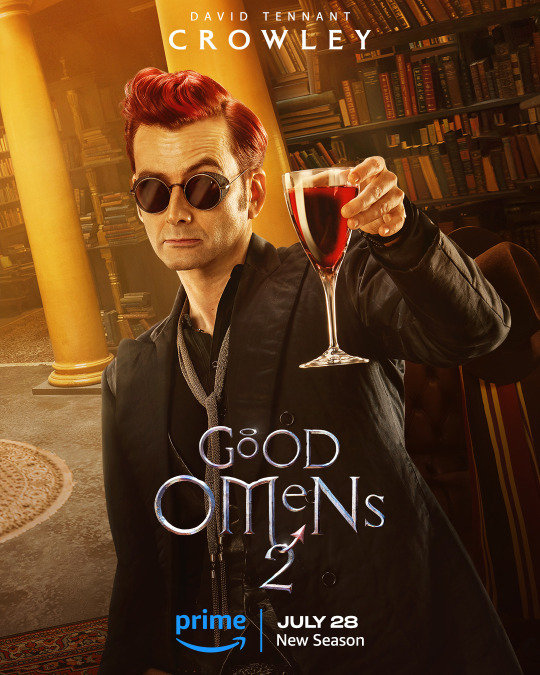

So... they didn't burn it? Or they did burn it and then they recreated it and didn't actually use it for s2??
I can't think or even breathe, this is SO WEIRD.
Interested in diving further into all the Good Omens mysteries? I have lots more of my own posts plus Clues and metas from all over the fandom, here.
#good omens analysis#good omens mystery#Aziraphale's rug#bookshop rug#good omens bookshop#clue with a capital C#good omens the ball#good omens magic trick#good omens#good omens meta#renew good omens#good omens 2#good omens continuity#unreliable narrators#Good omens conspiracy theory#Good omens truther#Good omens season 1#Good omens season 2#everything is meant
222 notes
·
View notes
Text
I wish we got a better reaction out of Wymack and the Foxes when Neil get back from Christmas break, like my guy provided no context to why riko changed his like entire look....like the dont even really get that thats his natural look untill the birthday blood shit.....like neil gives them nothing but a lame 'he threatened you if i change it back' like the team must be so confused, like WHY DOES RIKO WANT HIM GINGER, it not even raven aethestic....? Not to mention Andrew coming back from easthaven and like, he knew about his eye, but the man pulls up looking like he lost a fight with a train and is just... Not hiding them anymore? And is a ginger.....AND NO ONE QUESTIONS IT?!
#all for the game#neil josten#evermore#palmetto state foxes#psu foxes#fhc#trk#tkm#the kings men#neil being neil#unreliable narrators#andreil#aftg#exy#riko moriyama#nathaniel wesninski
240 notes
·
View notes
Text
as a huge unreliable narrator enjoyer i love the fact that the raven tower is narrated by someone who cannot lie. so the narration is not unreliable, and any kind of uncertainty is always couched in "here is a story i have heard" or "i imagine", but it scratches the same itch as unreliable narration because the evidentiality of the narration is still so central, just in the opposite way. stories that don't care about where the narrator is getting their information or what biases are present in the way that information is shared with us are on one end of a spectrum, and stories that do care about those things are on the other end, and the raven tower is firmly situated alongside the unreliably narrated stories even though the whole point is that the narrator is as motivated as it is possible to be to never say something that is untrue. and it's fascinating to see how ann leckie manages to build suspense and subvert expectations without really at any point deliberately misleading the reader. every time i reread one of her books, the bouncing of the dvd screensaver in my brain gets a little more frenetic. how does she do what she does. ann leckie what is your secret.
#this post is spoiler-free btw. the narrator is very upfront about the fact that it can't lie and says this very early in the story#i'm only like 40% through my reread and i don't remember any details of what happens but i'm already losing it#and the fact that it's first-person second-person narration...completely undivorceable from the conceit of the book#might write a different post about that but probably only after i finish rereading#i finally got my sister to agree to read it and she's like 'i read the first fifteen pages! i like the style'#and i'm barely restraining myself from being like girl please read another fifty pages and get back to me#if you are not frothing at the mouth by page 100 then your money back. guaranteed.#my sister loves semantics like the linguistic subfield of semantics so i've been begging her to read this for so many years...#like i KNOW she will love it when that stuff starts becoming apparent. which is remarkably early in the book#hrrrrhughghrhrrgh i want to talk about it so bad#the raven tower#ann leckie#my posts#unreliable narrators#or not!!! actually!!!#storytelling#semantics
78 notes
·
View notes